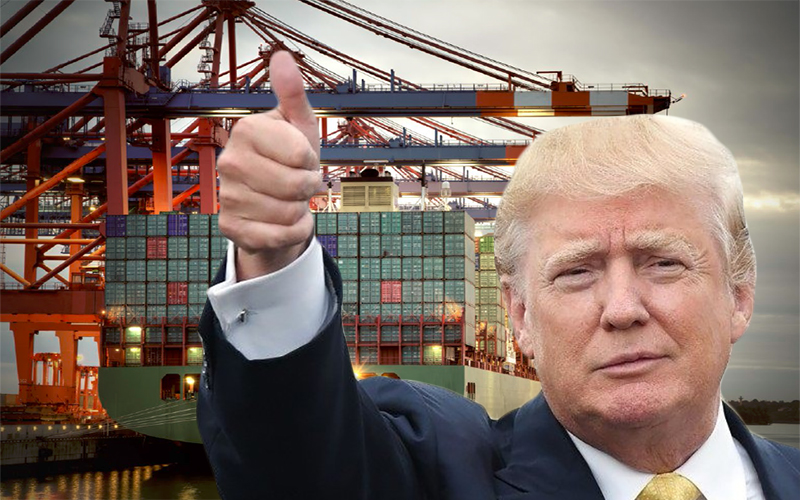Clinton, Trump and the Illusion of US Hegemony

There are questions of leadership concerns shaping the election conversation, especially from Monday's presidential debate, however, both candidates need to recognize and start talking about the intersection of technology, jobs and transportation, both domestically and globally.
There was plenty to read between the lines in Monday's presidential debate, from how the unsmiling, ultra-masculine persona of Donald Trump reflected his angry, anxious base, to a lack of critique from both sides about the basis for and follow-up to NATO's intervention in Libya.
But looming over the entire conversation - and indeed, the entire Western world's current political crisis - is the white noise of fading hegemony.
The US is losing its place in the global order, and Europe is coming with it.
This shift is impacting the rise of far-right, fascistic movements both here and across the EU. It is also one of the reasons that the West won't do anything about Syria besides offering limited funding and symbolic support to multiple factions of the opposition.
Far from a long-planned conspiracy, it's more of a “throw stuff at the wall in the hopes that something sticks” strategy.
Why? Isn't this the “New American Century”?
Rising powers, both at the regional and international level, are filling voids left by the US in its decline. Nowhere is this more acutely felt than in the Middle East. Saudi Arabia invaded Yemen; Israel continues incursions into Gaza; Russia plays a central role in the defense of the Syrian regime. Multiple US allies fund various (and often opposing) sides of the Syrian war. All of these moves have been against the wishes of the US, which did not want to see a further escalation in a region where its power had been weakened so much by its defeat in Iraq.
Domestically, populations that have been poised to benefit from long-term US power - white America, for instance - are feeling the possibility that they may have to live different lifestyles in the future. Their fear of even slight downward mobility, mixed with their privilege-enhanced expectations, is pushing the agendas of the far right, which has successfully eclipsed traditional conservative ideas with a neofascist agenda that places the US, Austria and the UK first.
Trump admits this relative decline, more or less, when he paints a picture of a US where “everything is bad” and we are “losers.” Even the freshly renovated, waterfall and sculpture-filled airports of the US are apparently in “third world” condition to him. Though such a description is a blatant mythology (the US has fairly state-of-the-art airport facilities and a very safe travel record), it may sound like it could be true, to those who think the country is falling apart.
The idea that the country is literally deteriorating backs up Trump's image of an America on the brink of extinction, and justifies the state-of-siege mentality his campaign relies on for its momentum. While its decline as a hegemony is a reality, the inevitable, near-term, catastrophic end of the US itself is a fiction invented by the same folks who deny the existence of climate change and swear that Obama is secretly a Muslim.
However, there are multiple generations now that were raised to believe they would be better off than their parents, and their dreams are being shattered. That belief, reliant on a US that would rule the world for a long time to come, is not standing up to reality. Though generations of administrations have distributed soldiers across the world, built large military bases, and designed trade pacts to solidify economic arrangements that favor US corporations, they no longer see a future in their favor.
Part of the US losing its place in the world is due to the very nature of corporate globalization: It doesn't favor nation-states. Multinationals, when the rubber meets the road, have no allegiance to country. This is why Dick Cheney's beloved Halliburton moved its corporate offices to the United Arab Emirates. It's why Trump couldn't admit that he has no strategy to prevent “American” corporations from moving factories overseas. You can't have neoliberal capitalism and also have the regulations needed to prevent things like outsourcing and capital flight. Trump, at the end of the day, is a man of the corporation, not the country. He is one of them, Clinton works for them.
Monday night, Trump admitted something besides the fact that he may not pay federal income taxes: The US is “losing to China.” His way of combating this is still a mystery, though he claims to oppose the Trans-Pacific Partnership (TPP) because it is not pro-America enough for him. Clinton claims to oppose it, too, probably in the hopes that President Obama will fast-track it in so she doesn't have to prove her opposition. Basically, she's passing the buck before it is even handed to her. Perhaps Trump is, too.
Either way, there's a reason the TPP does not include China. It's designed for a specific type of US-centered trade that, like the scramble for Asia after WWII, is about US economic and political dominance in the region. But trade deals like the TPP are designed against the institutions of nation-states. They are designed for the “para-state” corporations, which wield far more influence over Western governments than voters do.
It's a catch-22 for the politicians who claim US allegiance but depend so heavily on the corporate sector. And since greed navigates so many of these decisions, they simply can't stop the process. So the snake eats its tail.
The specter of Chinese dominance is no small thing, nor is it a case of classic “red-bashing” against the pseudo-communist state or a bizarre “Trumpism” from the demagogue's own head; it's an economic reality that threatens the “American way of life,” that mythic economic comfort enjoyed (or at least anticipated) by a predominantly white part of the country. The historic memory of this way of life, summed by Trump's “Great America,” is strong. And while it did exist once, in the 1950s, it was only for a racially and economically select few. Still, its imagery has a convincing strength, and Trump's promise to “return” it captures many a white heart.
But it's not just those at the top who are scared. A shift in the global economy that pushes the US off the top would also affect the rest of the country by determining the prices we pay for food, clothes, and other essential and consumerist commodities in a post-US-centric trade environment. The conversation should be about how we navigate this with humility, and balance the drastically uneven distribution of resources in this country so that our decline doesn't result in the kind of catastrophic wars that occurred with the decline of the European empires.
While Trump invokes the decline without totally naming it, Clinton ignores or denies it. Why? Because her entire policy set is designed specifically to maintain the illusion of US supremacy. It's a macro-political version of what '60s New Left activist Rennie Davis called “organizing with mirrors,” attempting to create a reality by convincing enough people that it already exists. This illusion dovetails with the Wall Street economy, which is itself based on similar principles: Ponzi schemes designed to create realities based on perception, fear and expectation. Clinton hopes she can talk US hegemony's way into a continued existence.
Due to the depth of the crisis, both candidates' promises, most certainly, will be but flashes in the pan. Only an alternative based on a drastically changed US foreign policy, bound to some type of global framework for mutual benefits amongst all people, would prevent the current destabilization from becoming yet a new global order based in the rule of the many by the few. Different players may soon take the controls, but there is little rationale to believe they will have a more moral or sustainable approach to the game.
Shading our view of this decline, especially among the political left, is an often conspiratorial assumption that the political class is always in control and that global developments are always benefiting those who instigate them. Iraq is a perfect example of the fallacy of this perfect control. It was a war launched for a blundering, desperate US foreign policy establishment to establish footholds in an important geostrategic location. It resulted in a military defeat. Moreover, the oil contracts made possible by the International Monetary Fund-supported “Oil Law” that were destined for Western corporations were sent by the new Iraqi government in the direction of Russia and China. The new Iraq has since positioned itself closer to Iran politically, and seems more interested in doing business with China than the US. This wasn't exactly the plan.
While many conservative voters argue that the US brought democracy to places like Iraq, they show no enthusiasm for actual democracy. Trump's critique of the UN and NATO is basically that they are not American institutions. Clinton's embrace of them is justified by them being “American” enough for the long game.
Trump wants the short game. War is fine if it's quick, efficient and we win. His problem with Iraq is not that it was wrong; it's that the US lost.
But Iraq's about-face is a sign that the world knows about the US decline, and even though it still lives under its waning power, it's starting to crawl out from under it.
In the end, for both candidates Monday night, the debate over these international institutions was over how much they benefit the US, not the broader world. Granted, the UN is not a model institution, and begs drastic reforms, while NATO begs abolishment. Still, it was not the actions of these institutions that was up for debate so much as the idea of them: Global alliances of governments interacting as partners do not suit the hyper-masculine, empathy-deficient worldview of Donald Trump. And for Hillary Clinton, the justification for both institutions is based on their willingness to be partners in a larger US agenda. The world is not involved in the matter.
Unfortunately, for both candidates, the question is how the US should maintain global hegemony, not if it should.
About the Author
Ryan Harvey is a musician, writer, activist and the cofounder of Firebrand Records. He spent the month of February volunteering in the refugee solidarity movement in Lesvos, Greece.
Source: Truthout
Image: DonkeyHotey
Why the Tech Industry Should Care About the Next Secretary of Transportation
Donald Trump’s Twittering and Hillary Clinton’s email server aside, the 2016 election has been light on conversations about the future of tech.
But political consultant Bradley Tusk wants the candidates to start talking about the intersection of technology, jobs and transportation.
“I think in some ways the Secretary of Transportation, for tech, may be the most important pick [Hillary Clinton] makes,” Tusk said on the latest episode of Recode Decode, hosted by Kara Swisher.
“They’re going to oversee all the autonomous vehicle stuff on both cars and trucking, and they oversee the FAA, so that’s drone policy,” he added. “It’s really important that the sector use its influence, whatever they have with her, to get someone good.”
(As the quotes above suggest, Tusk - a longtime adviser to former New York City mayor Michael Bloomberg - has written off the possibility of a Trump victory in November.)
He argued that the regulatory complexity of self-driving vehicles, as well as the complexity of local government, made it ripe for federal action.
“I hate doing things in Washington, but this is an example where ... you need federal preemption, which means you need to pass major legislation through Congress,” Tusk said. “If I were Hillary and I wanted to do something forward-thinking on tech, I would make autonomous [transportation] an issue.”
He cited the historic example of efforts in the early 1980s to raise the national drinking age to 21 - even though that was a regulation that only states could enforce. President Reagan and members of Congress accomplished this feat via the National Minimum Drinking Age Act, which incentivized the states by cutting their federal highway construction funds by 10 percent if they did not comply.
In the end, though, Tusk seemed pessimistic about the potential for a techie transportation secretary, suggesting Clinton may only appoint someone like HP Enterprise CEO Meg Whitman as Secretary of Commerce, even though “commerce doesn’t regulate anything important.” He was also not impressed by either candidate’s tech platform.
“She wants to take us back to 1990s, he wants to take us back to the 1890s,” Tusk said. “Neither of them are particularly great.”
Source: Recode
Article Topics
GT Nexus News & Resources
The Current and Future State of Digital Supply Chain Transformation Infor Coleman AI Platform to ‘Rethink Supply Chain’ and Maximize Human Work Potential End-to-End Visibility: Handling the Demands of Retail Mastering Supply Chain Finance ERP Suppliers’ Changing Role New Logistics TMS Platform Sets Sights on SAP Amazon Selects Infor for Global Logistics Business More GT NexusLatest in Supply Chain
Microsoft Unveils New AI Innovations For Warehouses Let’s Spend Five Minutes Talking About ... Malaysia Baltimore Bridge Collapse: Impact on Freight Navigating TIm Cook Says Apple Plans to Increase Investments in Vietnam Amazon Logistics’ Growth Shakes Up Shipping Industry in 2023 Spotlight Startup: Cart.com is Reimagining Logistics Walmart and Swisslog Expand Partnership with New Texas Facility More Supply Chain
















